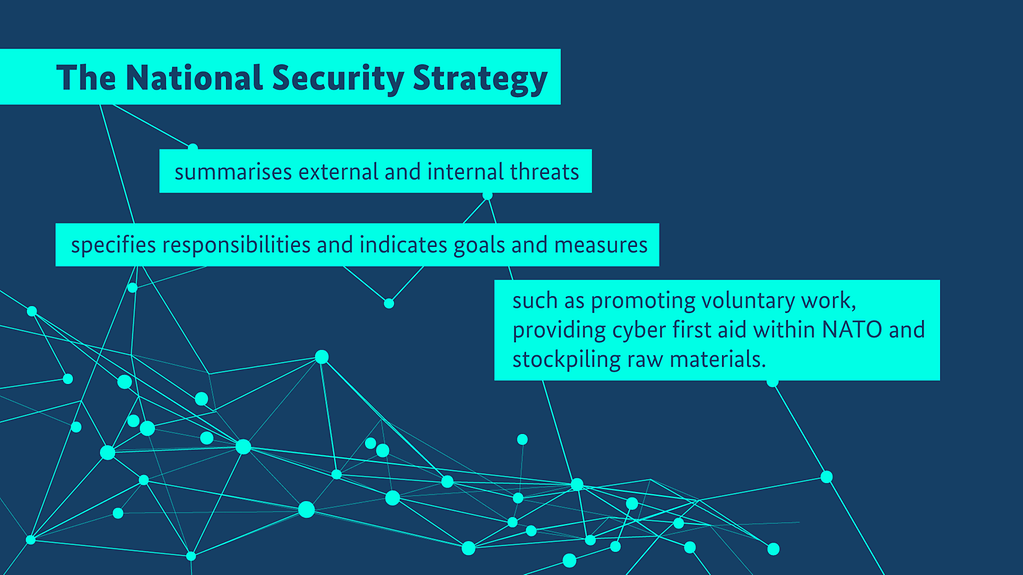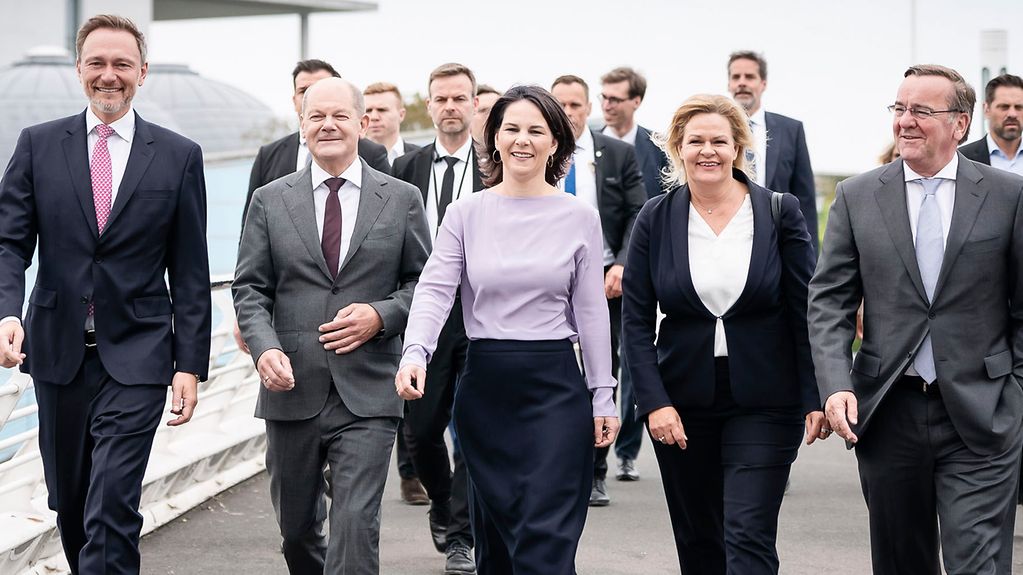Presentation of the National Security Strategy
A changed security policy environment, increasing multipolarity, threats to democracy, society and economy and the impact of the climate crisis: the Federal Cabinet adopted the National Security Strategy aiming to respond to these challenges and protect Germany and its citizens.
4 Min. Lesedauer

The National Security Strategy answers a wide range of questions: Who is threatening our country and how? And who is responsible for preventing this?
Foto: Federal Government
“For the first time in the history of our country, we have drawn up a National Security Strategy for the Federal Republic of Germany,” said Federal Chancellor Olaf Scholz. Following the meeting of the Federal Cabinet, the Federal Chancellor, Foreign Minister Annalena Baerbock, Federal Finance Minister Christian Lindner, Federal Minister of the Interior Nancy Faeser and Defence Minister Boris Pistorius presented the strategy that has now been adopted.
Drastically changed conditions
“What used to be a white paper limited to defence policy has now been replaced by a far more comprehensive and systematic overall approach,” Scholz added. He explained that drawing up a National Security Strategy was part of the coalition agreement of the parties that form the government, but that the process had been influenced by the drastic security policy changes that had occurred over the past 18 months.
The Federal Foreign Office had been instructed to draw up the strategy “before the turning point, before Russia’s attack on Ukraine, before this brutal war that has since been going on in Ukraine, and before the explosions of the Nordstream pipelines,” the Federal Chancellor pointed out. Despite all changes, it remained the state’s central duty to ensure its citizens’ security without compromising, he added. “After all, there can be no freedom without security, and no stability or prosperity, either.”
Foreign Minister Baerbock said that the Russian war of aggression had shown “that peace and freedom do not fall from the sky”, and that the challenges with regard to security for Germany affected all areas of life, such as medication, cyber space or clean water.
Federal Finance Minister Lindner pointed out that Germany’s security needed a “360 degree perspective”. All departments of the Federal Government were contributing to this, and it was also a challenge with regard to financial policy, Lindner said. The COVID-19 pandemic and the energy price shock in the past year would have been linked to a significant threat to social peace under other circumstances, he added, “if there had been no fiscal reserves”. International financial stability was also directly linked to crisis prevention, Lindner explained.
Three central dimensions of political action
“Robust. Resilient. Sustainable. Integrated Security for Germany” – this is the title of the National Security Strategy.
The most important task of security policy is to ensure that Germany’s citizens can live peacefully and enjoy freedom and security also in the future. In order to ensure this, Germany must be able to protect and defend itself and its allies.
In this context, the Federal Government continues to be firmly committed to NATO and the EU. The Federal Armed Forces are strengthened in a sustainable manner to ensure that they can fulfil their core duty of national and alliance defence. A macrosocial approach provides for improved civil defence and population protection.
The Federal Government accepts its responsibility in international crisis management unwaveringly. After all, Germany’s security is inseparably linked to security and stability in other parts of the world.
Life in freedom can only be ensured if the society and economy are resilient, adaptable and internally stable. To this end, the free democratic basis must be protected and defended against illegitimate external influences.
Together with its international partners, the Federal Government advocates for a free international order based on international law and the United Nations Charter. Another goal is to reduce unilateral dependence in raw materials and energy provision by diversifying supply relationships.
The Federal Government is going to cooperate with the business sector to promote raw material projects and build up strategic reserves. Furthermore, it is going to strengthen cyber security and dedicate greater attention to space security.
The consequences of the climate crisis and threats to the natural basis of life give rise to a fundamental threat for future generations in particular.
Early action can save lives. This is true with regard to fighting the climate, biodiversity and ecosystem crisis, as well as for improving global food security and global pandemic prevention, which is why the Federal Government also chooses to focus on prevention.
Further information is available on the website dedicated to the National Security Strategy. You can read the full document here.

Federal Chancellor Scholz (2nd from left) and Ministers Lindner, Baerbock, Faeser and Pistorius (left to right) on their way to the federal press conference.
Foto: Federal Government/Denzel
Integrated security is not limited to defence
The National Security Strategy draws conclusions for the future, aiming to ensure security. To do so, it establishes an internal security policy. “This is not all about defence and the Federal Armed Forces,” Federal Chancellor Scholz explained. Instead it was “about all aspects of our security, ranging from diplomacy, via the police, fire brigade and technical relief services, development cooperation and cyber security, through to the resilience of supply chains,” he said.
The strategy was not “the end but a starting point” for an ongoing process in which all government levels cooperate to sustainably strengthen security, as well as the economy and society, Scholz added. “Germany is a strong country. This is why we can meet the tasks ahead of us confidently and optimistically.”
Foreign Minister Baerbock pointed out that the National Security Strategy was addressed not only to the Federal Government but to society as a whole. “The Security Strategy will only work if we succeed in enshrining it at the European and transatlantic level.” Much closer cooperation with partners on other continents was needed, she said.